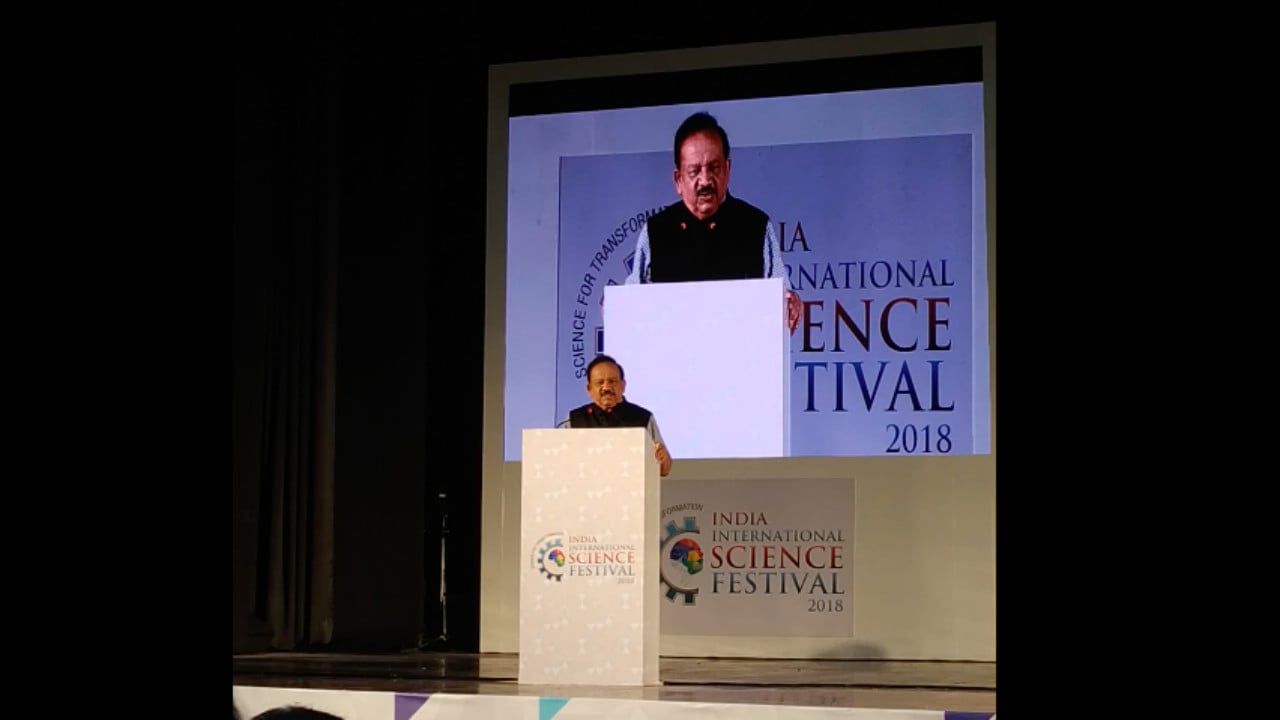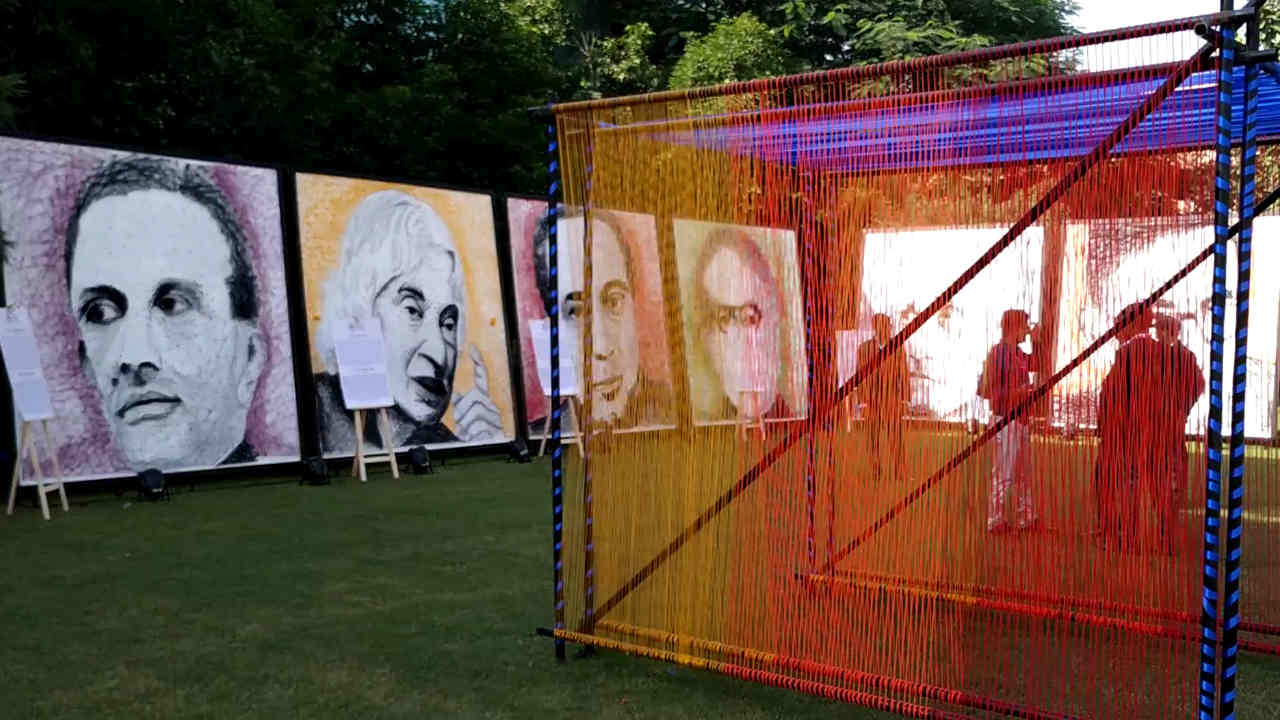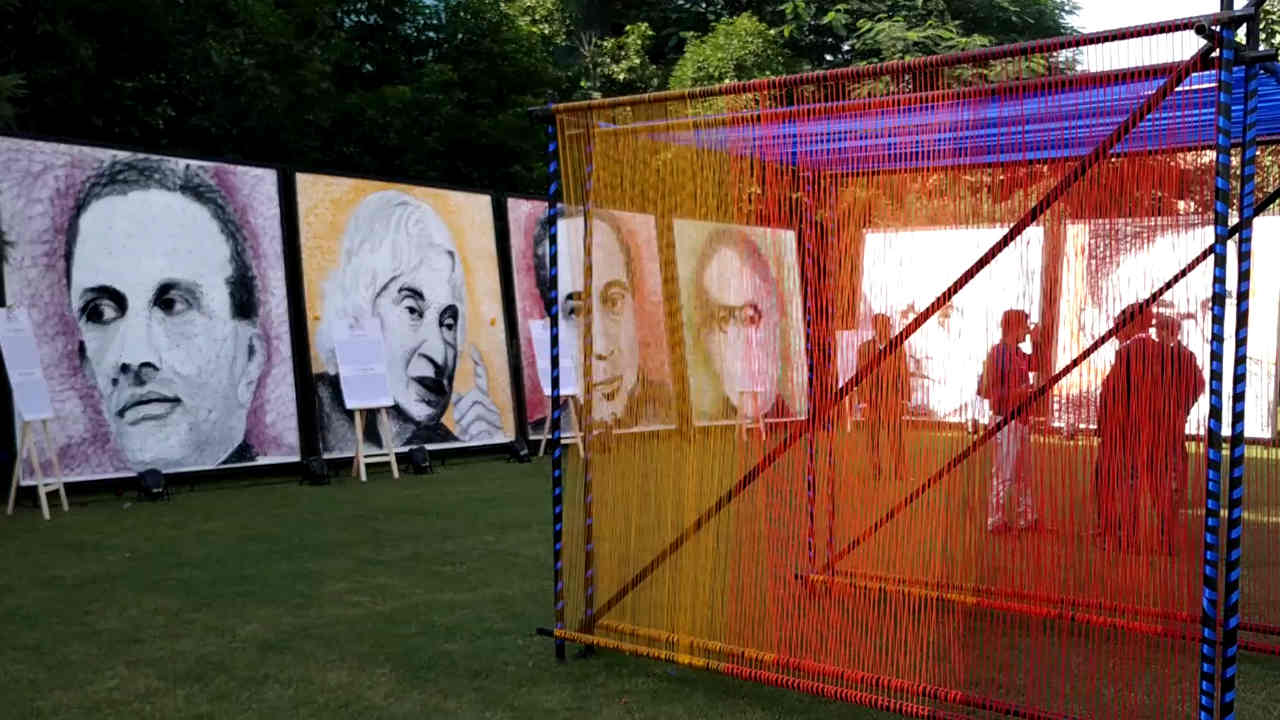The 4th India International Science Festival got off to a grand start on 5 October at the Indira Gandhi Prathishtan in Lucknow. The first of the four-day festival saw scientists, students, experts in different fields of science from across the country in hundreds, along with members of India’s science policy team that inaugurated and introduced the day’s sessions. [caption id=“attachment_5329501” align=“alignnone” width=“1280”] The 4th edition of the India International Science Festival is a four-day event that brings researchers, educators and policy makers closer to students and members of the public. Image: Tech2[/caption] Setting the stage for diverse voices in the science community The Union Minister of Science and Technology, Dr Harsh Vardhan, inaugurated a few of the key events himself, including the Young Scientists Conference and the Global Indian Science and Technology Stakeholder’s Meet. [caption id=“attachment_5329521” align=“alignnone” width=“1280”]
 Union Minister of Science and Technology, Dr Harsh Vardhan, who inaugurated the Young Scientist and Global India Science and Technology Stakeholders Meet among other sessions, highlighted that young scientists play a critical role in realising the vision of a New and transformed India. Image: Tech2[/caption] “If there’s a new idea, a new inspiration, a new purpose that our (young scientists) take away from this science festival and devote their life’s work and time to it, the aim of putting this event together will be satisfied,” Dr Harsh Vardhan said at the Young Scientist Conference. “I truly believe that our young scientists play a key role in bringing our dream of a New India to life.” Weaving NRI scientists and technocrats into the fold Another key event from day one was the first or a two-day Global India Science and Technology Stakeholder Meet. At the session, Dr Y K Gupta, Former Dean of the All India Institute Of Medical Sciences moderated a discussion with five internationally-eminent Indian scientists about what role Indian scientists and technocrats abroad can play in critical areas of India’s development, particularly economic and inclusive growth. [caption id=“attachment_5329541” align=“alignnone” width=“1280”]
Union Minister of Science and Technology, Dr Harsh Vardhan, who inaugurated the Young Scientist and Global India Science and Technology Stakeholders Meet among other sessions, highlighted that young scientists play a critical role in realising the vision of a New and transformed India. Image: Tech2[/caption] “If there’s a new idea, a new inspiration, a new purpose that our (young scientists) take away from this science festival and devote their life’s work and time to it, the aim of putting this event together will be satisfied,” Dr Harsh Vardhan said at the Young Scientist Conference. “I truly believe that our young scientists play a key role in bringing our dream of a New India to life.” Weaving NRI scientists and technocrats into the fold Another key event from day one was the first or a two-day Global India Science and Technology Stakeholder Meet. At the session, Dr Y K Gupta, Former Dean of the All India Institute Of Medical Sciences moderated a discussion with five internationally-eminent Indian scientists about what role Indian scientists and technocrats abroad can play in critical areas of India’s development, particularly economic and inclusive growth. [caption id=“attachment_5329541” align=“alignnone” width=“1280”] An artistic tribute to some of India’s greatest scientists. Image: Tech2[/caption] The second session of this Meet, on the 6 October, will bring six such NRI scientists to voice their thoughts about positioning India as a global leader in science and technology, followed by an open discussion with current members of the Departments of Science and Technology and Biotechnology. Women Empowerment and Child Health A less public dialogue running parallelly on the sidelines was a panel discussion on ‘Women Empowerment and Child Development’ at the National Social Organisations and Institutions Meet (NSOIM). At the gathering, senior researchers in women’s health, NGOs and social organisations working towards healthy mother and child development shared short presentations about the work they do and some of their biggest hurdles. “We know that government is working towards improving conditions at the grassroots. We also know our role in helping the government fulfil its role”, said Dr Sapna, who runs an organisation addressing malnutrition at the grassroots in Maharashtra. [caption id=“attachment_5329551” align=“alignnone” width=“1280”]
An artistic tribute to some of India’s greatest scientists. Image: Tech2[/caption] The second session of this Meet, on the 6 October, will bring six such NRI scientists to voice their thoughts about positioning India as a global leader in science and technology, followed by an open discussion with current members of the Departments of Science and Technology and Biotechnology. Women Empowerment and Child Health A less public dialogue running parallelly on the sidelines was a panel discussion on ‘Women Empowerment and Child Development’ at the National Social Organisations and Institutions Meet (NSOIM). At the gathering, senior researchers in women’s health, NGOs and social organisations working towards healthy mother and child development shared short presentations about the work they do and some of their biggest hurdles. “We know that government is working towards improving conditions at the grassroots. We also know our role in helping the government fulfil its role”, said Dr Sapna, who runs an organisation addressing malnutrition at the grassroots in Maharashtra. [caption id=“attachment_5329551” align=“alignnone” width=“1280”] At the Women Empowerment and Child Health session, Swati Bedekar, Founder of Sakhi, speaks about the importance of rural education about reproductive health. Image: Tech2[/caption] The majority of speakers and audience at the NSOIM meet were socially-engaged, concerned and proactive women who used the platform as a means to get the word out about successful strategies to some of the grassroots challenges they faced. They troubleshot this with other social organisations in an open discussion with members and a modest number of audience devoid of any government representatives. Young scientists talk about their research One of the more inspiring sights of the day was a poster session by over 80 young researchers from many different states and schools, presenting their research from schools and college to members of the academia, government, public and the Chief Minister of Uttar Pradesh, Dinesh Sharma. A common weave of patriotism ran through some of the larger events at the IISF, with variations of Atal Bihari Vajpayee’s legendary slogan “Jai Jawan, Jai Kisan, Jai Vigyan” resounding in mentions of ‘Vigyan se Vikas’ or ‘Science for Development’ across different sessions throughout the day. Many public events are lined up for day two at the science festival, including a formal inauguration by President Ram Nath Kovind , and an attempt to set the Guinness record for the largest public DNA isolation experiment by 500 students from Class VIII to X.
At the Women Empowerment and Child Health session, Swati Bedekar, Founder of Sakhi, speaks about the importance of rural education about reproductive health. Image: Tech2[/caption] The majority of speakers and audience at the NSOIM meet were socially-engaged, concerned and proactive women who used the platform as a means to get the word out about successful strategies to some of the grassroots challenges they faced. They troubleshot this with other social organisations in an open discussion with members and a modest number of audience devoid of any government representatives. Young scientists talk about their research One of the more inspiring sights of the day was a poster session by over 80 young researchers from many different states and schools, presenting their research from schools and college to members of the academia, government, public and the Chief Minister of Uttar Pradesh, Dinesh Sharma. A common weave of patriotism ran through some of the larger events at the IISF, with variations of Atal Bihari Vajpayee’s legendary slogan “Jai Jawan, Jai Kisan, Jai Vigyan” resounding in mentions of ‘Vigyan se Vikas’ or ‘Science for Development’ across different sessions throughout the day. Many public events are lined up for day two at the science festival, including a formal inauguration by President Ram Nath Kovind , and an attempt to set the Guinness record for the largest public DNA isolation experiment by 500 students from Class VIII to X.
The first of the four-day festival saw scientists, students, experts from across the country in hundreds.
Advertisement
End of Article


)
)
)
)
)
)
)
)
)



